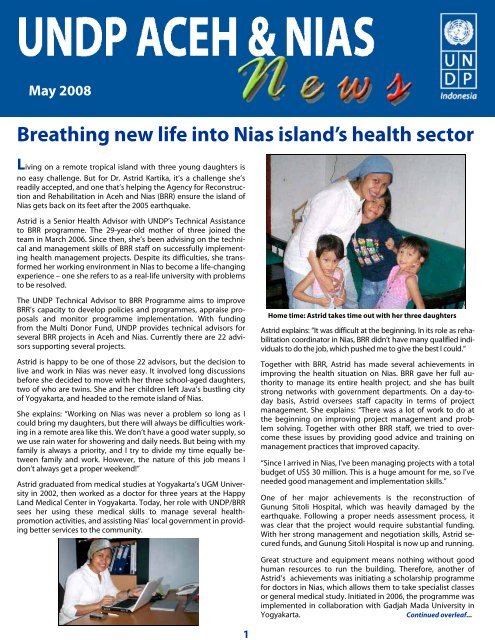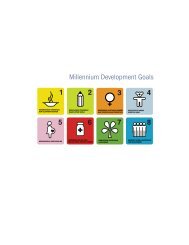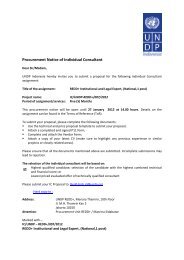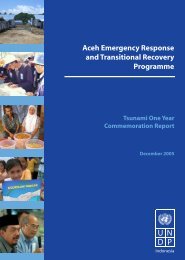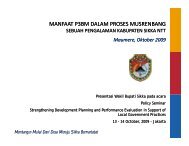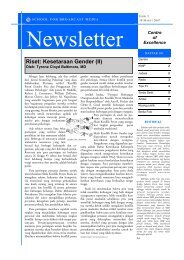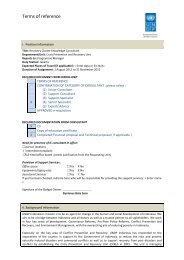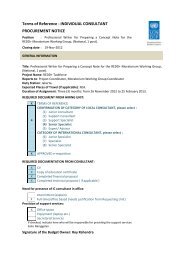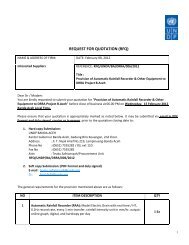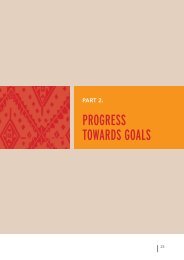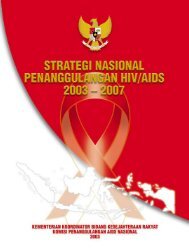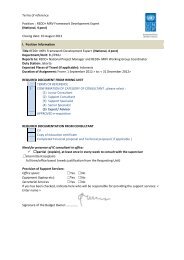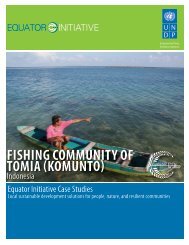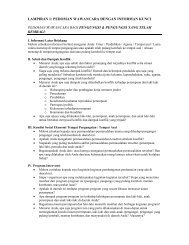may08 Aceh&Nias News.pub - UNDP
may08 Aceh&Nias News.pub - UNDP
may08 Aceh&Nias News.pub - UNDP
- No tags were found...
Create successful ePaper yourself
Turn your PDF publications into a flip-book with our unique Google optimized e-Paper software.
11May 2008Breathing new life into <strong>Nias</strong> island’s health sectorLiving on a remote tropical island with three young daughters isno easy challenge. But for Dr. Astrid Kartika, it’s a challenge she’sreadily accepted, and one that’s helping the Agency for Reconstructionand Rehabilitation in Aceh and <strong>Nias</strong> (BRR) ensure the island of<strong>Nias</strong> gets back on its feet after the 2005 earthquake.Astrid is a Senior Health Advisor with <strong>UNDP</strong>’s Technical Assistanceto BRR programme. The 29-year-old mother of three joined theteam in March 2006. Since then, she’s been advising on the technicaland management skills of BRR staff on successfully implementinghealth management projects. Despite its difficulties, she transformedher working environment in <strong>Nias</strong> to become a life-changingexperience – one she refers to as a real-life university with problemsto be resolved.The <strong>UNDP</strong> Technical Advisor to BRR Programme aims to improveBRR’s capacity to develop policies and programmes, appraise proposalsand monitor programme implementation. With fundingfrom the Multi Donor Fund, <strong>UNDP</strong> provides technical advisors forseveral BRR projects in Aceh and <strong>Nias</strong>. Currently there are 22 advisorssupporting several projects.Astrid is happy to be one of those 22 advisors, but the decision tolive and work in <strong>Nias</strong> was never easy. It involved long discussionsbefore she decided to move with her three school-aged daughters,two of who are twins. She and her children left Java’s bustling cityof Yogyakarta, and headed to the remote island of <strong>Nias</strong>.She explains: “Working on <strong>Nias</strong> was never a problem so long as Icould bring my daughters, but there will always be difficulties workingin a remote area like this. We don’t have a good water supply, sowe use rain water for showering and daily needs. But being with myfamily is always a priority, and I try to divide my time equally betweenfamily and work. However, the nature of this job means Idon’t always get a proper weekend!”Astrid graduated from medical studies at Yogyakarta’s UGM Universityin 2002, then worked as a doctor for three years at the HappyLand Medical Center in Yogyakarta. Today, her role with <strong>UNDP</strong>/BRRsees her using these medical skills to manage several healthpromotionactivities, and assisting <strong>Nias</strong>’ local government in providingbetter services to the community.Home time: Astrid takes time out with her three daughtersAstrid explains: “It was difficult at the beginning. In its role as rehabilitationcoordinator in <strong>Nias</strong>, BRR didn’t have many qualified individualsto do the job, which pushed me to give the best I could.”Together with BRR, Astrid has made several achievements inimproving the health situation on <strong>Nias</strong>. BRR gave her full authorityto manage its entire health project, and she has builtstrong networks with government departments. On a day-todaybasis, Astrid oversees staff capacity in terms of projectmanagement. She explains: “There was a lot of work to do atthe beginning on improving project management and problemsolving. Together with other BRR staff, we tried to overcomethese issues by providing good advice and training onmanagement practices that improved capacity.“Since I arrived in <strong>Nias</strong>, I’ve been managing projects with a totalbudget of US$ 30 million. This is a huge amount for me, so I’veneeded good management and implementation skills.”One of her major achievements is the reconstruction ofGunung Sitoli Hospital, which was heavily damaged by theearthquake. Following a proper needs assessment process, itwas clear that the project would require substantial funding.With her strong management and negotiation skills, Astrid securedfunds, and Gunung Sitoli Hospital is now up and running.Great structure and equipment means nothing without goodhuman resources to run the building. Therefore, another ofAstrid’s achievements was initiating a scholarship programmefor doctors in <strong>Nias</strong>, which allows them to take specialist classesor general medical study. Initiated in 2006, the programme wasimplemented in collaboration with Gadjah Mada University inYogyakarta.Continued overleaf...
2Continued from page one…Of all Astrid’s experiences in <strong>Nias</strong>, there’s one she’ll always remember: “<strong>Nias</strong> is a tropical island, and in 2006 my three daughters and Icaught dengue fever at the same time. I also injured my arm, which meant I couldn’t work at the office for a few days. I pushed on, andset up a temporary working space at my house for my assistants. It was a terrible time, but we managed to find some humour in it all!“I then caught dengue again the following year, prior to the opening ceremony for Gunung Sitoli Hospital, of which I was in charge ofthe ceremony committee and inviting VIPs. Sometimes, even doctors can’t get sick!”Using funds available for the reconstruction and rehabilitation of <strong>Nias</strong>, the island has made strong progress in improving services andaccessibilities. However, before she completes her assignment in December 2008, Astrid is determined to ensure that these improvementsare sustainable, and can help the people of <strong>Nias</strong> understand the importance of standing on their own feet. She concludes: “Ispend a lot of time explaining to colleagues that the people of <strong>Nias</strong> will have to work on their own when donors leave the island. <strong>Nias</strong>received a lot of funding following the tsunami and earthquake. However, this won’t last forever. It’s important to allocate funds in thebest way possible for sustainable future development. I really hope that when we leave <strong>Nias</strong>, its people will have the capacity to developwith their own resources.”For more information on the Technical Support to BRR Programme, please contact: sulaekha.kusumaningrum@undp.orgEnhancing capacity of Aceh’s Civil Society OrganizationsMore than 6,000 beneficiaries will start to see an improvement intheir livelihoods, following <strong>UNDP</strong> and implementing partner MuslimAid’s disbursement of grants to Civil Society Organizations(CSOs) in Aceh.<strong>UNDP</strong>’s CSO programme aims to improve communities’ socioeconomicconditions in 35 villages in Banda Aceh; Aceh Besar;Aceh Utara; Pidie; Bireuen; Sabang; and Aceh Tamiang. The grantswill help strengthen the capacity of CSOs in managing their respectiveproject activities in Aceh, such as income-generating activities,basic social services and women’s empowerment.<strong>UNDP</strong>, Muslim Aid and Multi Donor Fund representatives selectedthe grantees in late 2007. A total of 40 CSO proposals were selectedfrom 107 submitted proposals.One of those CSOs set to benefit from the grants is Forsikal, a localCSO focusing on population and environmental issues in Aceh.Forsikal is among several NGOs based in Aceh that registered theirproject proposals to Muslim Aid. The organization mainly focuseson education, economic development, health counseling, andsanitation sectors in Aceh.Programme Manager Hamdan said: “Forsikal will implement awomen’s support programme, where some 80 women will be empoweredwith dressmaking skills. We were happy our proposalfulfilled the criteria required by <strong>UNDP</strong> and Muslim Aid. The fundwill indirectly benefit up to 200 people in Banda Aceh’s KampungPande, Kutaraja sub district.“We’ll train and teach beneficiaries how to make quality tailoredclothes and assist them in marketing their products to local markets.So far, we’ve completed the socialization of our project, andplan to finish the project by the end of May 2008. I hope this programmecan increase women’s income and develop the economicsector in the village.”2Beginnings: CSO Programme Coordinator Ujang Suparman (left)and Muslim Aid’s Mizanur hand over the first small grant.Muslim Aid Programme Manager, Mizanur Rahman, explained:“At first we gave 30 percent of the grant to selected CBOs/NGOsin January to help kick start their projects. The second disbursementis made after 60 percent of the project is achieved. Theremaining sum is then paid out when grantees have completedtheir project. I hope this programme will provide a more prosperousway of life for communities through sustained livelihoods.”This CSO programme will continue to the second implementationphase along the west coast, followed by monitoring andevaluation of the programme in December in partnership withAssociation for Community Empowerment (ACE).<strong>UNDP</strong> is also building the capacity of CSOs/CBOs through a seriesof organization-management trainings in partnership withIMPACT, a local capacity-building organization (see page 5).For more information on the CSO Programme, please contact:ujang.suparman@undp.orgMay 2008
3May 2008Aceh’s Governor makes historical recruitment choice3Eager to ensure a professional government that can manage thedemanding times ahead, the Governor of Aceh has taken an historicstep. Working with <strong>UNDP</strong> and policy experts from Indonesia,the UK and Malaysia, he encouraged a rigorous recruitment processnever before used in Indonesia, and which resulted in the fairand transparent recruitment of 42 heads of government departments.It’s a process that challenges the notion that a doctor should managethe government’s health department, or a forestry expert leadthe forestry agency. Instead, competent and experienced Civil Serviceemployees were given the chance to lead the Government ofAceh’s departments in line with the Governor’s vision, mission andaspirations for the region. So successful was the process, it hasalready been replicated in districts across Aceh.The recruitment process was in preparation for a transformation ofthe Provincial Government’s role. When the Agency for Rehabilitationand Reconstruction in Aceh and <strong>Nias</strong> (BRR) completes its mandatein April 2009, it will transfer all responsibilities and assets toAceh’s government. In addition, the administration will assumeresponsibility for over $1billion of ongoing development grantsand newly agreed special autonomy funds, as well as assume thecoordination of ongoing programmes funded by the internationalcommunity.Governor Irwandi Yusuf, now more than 15 months into his mandate,was acutely aware that his administration needed to be reorganizedand strengthened to make it more responsive, and capableof ensuring good governance during the period in which itsresponsibilities increase substantially – in line with its increasedpressures to deliver.Governor Irwandi sought the logistical and technical support of<strong>UNDP</strong> as an independent catalyst for the challenge of restructuring.He expressed his desire for an open and accountable recruitmentmethod that would restructure the original 52 governmentdepartments, and ensure only the most competent agency headswere appointed to develop the province. He wanted an innovative,fair and transparent process using international best practiceand local expertise.To bring this to fruition, <strong>UNDP</strong> sought the expertise of Dr WillyMcCourt, Director of the Institute for Development Policy andManagement at the UK’s University of Manchester; Mrs Lee MengFoon, Management Consultant and former Deputy Director of theNational Institute of Public Administration in Malaysia; ProfessorJasman and Ibu Nurdasila from Banda Aceh’s Syiah Kuala University;and Pak Alit from national NGO YIPD.Working with <strong>UNDP</strong>’s Governance team, these individuals developeda series of detailed tests and interviews, referred to as Fit andProper Tests. They were conducted at a residential AssessmentCentre – a process regularly used by Governments across theworld.A fit & proper process: candidates test their knowledge during exams“In order to fulfill the expectations of the people, civil society,central Government and the international community, the newprovincial government of Aceh has to strengthen its capacity togovern,” said Dr Willy McCourt. “This includes meeting its existingresponsibilities, and taking on new responsibilities to lead andmanage the province’s long-term recovery and development.”The first step was a recruitment campaign through media inAceh, Jakarta and Medan, which gave Civil Service employees theopportunity to apply for the 42 agency head positions. The campaignwas unique in that the positions were open to employeesranked one grade below the positions being advertised.The shortlisted candidates were then put through a rigorous assessmentprocess at an Assessment Centre established in BandaAceh. The Centre was similar to that used for other civil serviceselections, such as in the United Kingdom and Malaysia. The variousactivities and tests selected were challenging, requiring severalcompetencies relevant for the <strong>pub</strong>lic service. This also includedcompiling and presenting a long-term strategy for a particulardepartment, in line with the Governor’s strategy.“The idea of having an Assessment Centre to select agency headswas itself an innovative and bold idea,” said Mrs Meng Foon, whowas actively involved in developing the Centre. “The advertisementreminded applicants that any attempt to exert undue influencethrough unethical means would result in disqualification,which was an innovative way to deter corrupt practices in therecruitment of senior government officials.”There was also mandatory training for all assessors at the Centre,to ensure their professionalism during the selection process. Theywere coached by professional facilitators on interview, listeningand observation skills, which are vital for an assessor.Continued overleaf...
4May 2008Aceh’s Governor makes historical recruitment choiceContinued from previous page...The assessors were recruited from universities across Indonesia. This balanced team of men and women used an impartial scoringsystem that allowed them to select the top 42 candidates. The Governor was then presented with a shortlist of 2 – 3 recommendedcandidates for each position. These included the top 42 and other candidates whose experience merited their inclusion, despitelower rankings in the tests. The Governor made his final decision after interviewing each candidate.The process provided sufficient information to select the most suitable candidate in the knowledge that the person chosen had undergoneAssessment Centre tests, and could manage a government department and professionally guide it through the transitionprocess ahead.The entire recruitment process lasted almost three months, and the end result was the desired result. On 11 March, 42 successfulcandidates were inaugurated at a ceremony in Banda Aceh.Added David Jackson, <strong>UNDP</strong> Senior Technical Advisor: “<strong>UNDP</strong> will continue working with the Governor to identify training and developmentneeds for the newly appointed heads of agencies. Plans are also underway to design a suitable performance managementscheme to compensate for greater efficiency and higher productivity from the new heads of agencies.”4For more information on <strong>UNDP</strong>’s work on this programme,please contact: david.jackson@undp.orgThanking the world for its unprecedented support<strong>UNDP</strong> Indonesia was represented by Country Director HåkanBjörkman, and <strong>UNDP</strong> Aceh-<strong>Nias</strong> Programme CoordinatorSimon Field. They received the President’s certificate ofthanks (pictured left) for <strong>UNDP</strong>’s rehabilitation and reconstructionwork through its Emergency Response and TransitionalRecovery (ERTR) Programme.“<strong>UNDP</strong>’s commitment to the region continues, and we willbuild on the success of our efforts since 2005,” said Simon.“Despite its devastating effects, the 2004 tsunami proved tobe a remarkable catalyst for change. Families in Aceh and<strong>Nias</strong> are rebuilding their lives, but the role these people haveplayed in the reconstruction and rehabilitation adds to thesignificance of this achievement.”It’s more than three years since the earthquakes and tsunamistruck Aceh and <strong>Nias</strong>. The disasters’ devastating effects have notbeen forgotten, and neither has the world’s support to Indonesia.Recognizing this support, the President of Indonesia hosted aceremony in Jakarta to express his thanks to the world for its extraordinaryresponse to the fatal events. More than 800 peopleattended, representing local and international organizations thatassisted in the massive relief effort.Heru Prasetyo, BRR’s Head of Donor International Relations, explained:“The President and BRR discussed the need for Indonesiato say what it has felt for so long. This was a thank-you to theworld for its unprecedented response to the events three yearsago.”<strong>UNDP</strong>’s ERTR programme was one of the first full-scale programmesto be established in the aftermath of the disaster. Itinitially focused on immediate rehabilitation and employment;recovery of livelihoods; housing and settlements; andcapacity building.In partnership with the Government, <strong>UNDP</strong> is now implementingits long-term development programme to help theGovernor achieve his vision for Aceh. <strong>UNDP</strong> has developed aprogramme to improve access to justice for people in Aceh,and is working closely with the provincial government toimprove governance and reduce the risks of future disasters.<strong>UNDP</strong> is also building on local civil society organizations’ capacityin securing the sustainable impact of recovery efforts.
5May 20085Boosting knowledge and skills for community facilitatorsFacilitators from across Aceh and <strong>Nias</strong> boosted their skills, knowledgeand confidence during a Training of Trainers session held inBanda Aceh. It's all part of <strong>UNDP</strong>’s Civil Society Organization (CSO)programme to strengthen the capacity and role of CSOs in Acehand <strong>Nias</strong>.In partnership with capacity-building organization IMPACT, andtraining agency Inspirit Innovation, the training was conducted tocreate smart and professional community facilitators who have theknowledge and skills to facilitate CSOs in Aceh and <strong>Nias</strong>.Kristina, a participant from a local CSO in <strong>Nias</strong>, expressed her gratitudefor the opportunity to participate in the training: “This wasinteresting and communicable, and the two trainers from InspiritInnovation gave me a lot of fresh ideas about facilitation work. Welearned how to clearly understand the meaning of facilitation, therole of facilitators, dialogue management, and how to help thecommunity solve their problems towards the CSO programmeimplementation."I hope there will be advanced training in the future, as we oftenface many people from different backgrounds. Thus such trainingwould be quite useful for people like me in facilitating the CSOprogramme in our area."IMPACT’s Executive Director, Ramadhana Lubis, said: “The facilitatorsare expected to provide trainings, facilitation, consultationand guidance in community development in their own area. Besidesnurturing professional facilitators, IMPACT will conduct 36trainings for 126 CSOs/CBOs in community development; leadershipand strategic planning; organizational development and projectmanagement; gender; and participatory monitoring of therehabilitation and reconstruction.”Learning by doing: participants at the IMPACT/INSPIRIT training.As well as hosting the training, IMPACT is also engaged by <strong>UNDP</strong> tomanage a Civil Society Resource Centre (pictured left), which is nowa valuable learning resource for facilitators and CSOs across Aceh.Located in Banda Aceh, the Centre has a twofold approach. It providesconsultants to train facilitators in facilitation skills, and thosefacilitators then train CSOs in capacity-building skills.Through financial and technical support from <strong>UNDP</strong>, the Centre wasfully established earlier this year. It now boasts 150 trained facilitators,and will assist 126 CSOs across Aceh through trainings on topicsincluding organizational and project management; communitydevelopment; gender awareness; leadership and strategic planning;and community-based monitoring.Muslim Hasan Birga, one of the Centre’s managers, explains: “TheResource Centre existed before the tsunami, but since then, andwith <strong>UNDP</strong>’s support, we’ve boosted its capacity. It’s now an excellentresource in strengthening community groups’ abilities, andhelps deliver more innovative ideas towards community development.We’ve had some very positive feedback from customers, andwe’re now focusing on our sustainability so that we can secure theCentre’s future.”The Centre’s consultants deliver trainings for facilitators twice amonth, and each week the CSO trainings are attended by representativesfrom CSOs who have received a <strong>UNDP</strong> grant. These threedaytrainings are delivered either at the Centre or remotely. And asthe Centre also offers accommodation, internet access and a library,participants have everything they need.Representatives from more than 70 CSOs supported by <strong>UNDP</strong> haveattended trainings since March. The Centre also offers trainings tothose outside the <strong>UNDP</strong> CSO programme, thus boosting its coreincome and extending its reach across Aceh. Many of these are repeatcustomers, eager to continue increasing their learning.Meeting of minds: the Civil Society Resource CentreFor more information on the CSO Programme and the Resource Centre,please contact: ujang.suparman@undp.org
6May 2008Keeping Banda clean and green on its anniversary6Banda Aceh’s residents took a novel approach to celebrating thecity’s 803-year anniversary: they gave the city a thorough clean in acommunity effort.Referred to as Gotong Royong Massal (Working Together as aGroup), it was a day where more than 25,000 people grabbedbrooms and cleaning equipment, and took pride in the cleanlinessof their respective villages. Local villagers; teachers; students; governmentstaff; military members; and NGO and UN agency staff alldid their bit to keep the local environment clean.Banda Aceh, previously known Kutaraja, was founded in April 1205.Its name changed to Banda Aceh in December 1962.The Gotong Royong Massal event was the original idea of Dinas Kebersihandan Pertamanan (DKP-Government department for healthand sanitation). DKP staff members proposed the idea to BandaAceh’s Mayor, and sought <strong>UNDP</strong>’s help in organizing the event.Through it Tsunami Recovery Waste Management Project (TRWMP),<strong>UNDP</strong> supported the event with cleaning equipment and t-shirts,and helped promote the event through workshops attended byvillage heads, teachers, NGOs and members from the local businesscommunity.At the day’s official opening ceremony, Banda Aceh’s Mayor,Mawardy Nurdin, gave an opening speech to an audience of morethan 300 people. Hundreds of balloons were then released into theair, giving everyone the signal that the cleaning could begin.“Today is a big day for the citizens of Banda Aceh, as the city hopesto become an Islamic Tourism City in Indonesia,” explained MayorNurdin.School support: Local children prepare to get involved in the eventThrough its TRWMP, <strong>UNDP</strong> began working closely with DKP in theimmediate aftermath of the 2004 tsunami. The programme initiallyfocused on clearing tsunami debris and demolishing earthquake-damagedbuildings. The support now also includes capacitybuilding for DKP, and waste management development.More than 25,000 people participated in the event, many of themteachers, students, government staff, NGO and UN teams, andvillagers. Local resident Nasrul said: “In the past we’ve just thrownwaste away without really thinking about clearing it up. But wewere happy to participate in this event - it’s making everyonethink about waste, and working together to do this cleaning.”“This goal can be achieved if everyone works together to keep ourenvironment clean and tidy. Keeping the city clean is not just a jobfor the Government, therefore we encourage everyone in BandaAceh to participate in today’s event.”Ready for action: the <strong>UNDP</strong> team prepare for Gotong Royong MassalFor more information on TRWMP, contact: antun.hidayat@undp.org
7Back to school with waste management issuesSchools across Aceh recently learnt about a new, environmentallyfriendly topic: waste management.Due to its successful implementation of waste management practicesin Aceh and <strong>Nias</strong>, <strong>UNDP</strong>’s Tsunami Recovery Waste ManagementProgramme (TRWMP) team recently had the opportunity totalk to school practitioners about the importance of waste management.The talks were given during a series of asset managementworkshops conducted by the Australian Partnership for Reconstructionand Development (AIPRD).The workshops were designed to increase understanding aboutthe causes of environmental problems in schools. More than 500participants including principals, committee members and teachersparticipated in the three-day trainings conducted in BandaAceh, Aceh Besar, Pidie, Aceh Jaya and Aceh Barat. The workshopswere a way to empower school practitioners through non-formaleducation and access to information.Staff members from <strong>UNDP</strong>’s TRWMP offered information on segregationof organic and non-organic waste, and waste recycling. ProgrammeAssistant Agus Mahdi explained: “Almost 60 participantsfrom schools in Aceh Besar joined the training. I introduced methodsfor making organic fertilizer through composting, which canbe used to recycle schools’ organic waste in a profitable way.“TRWMP has been recycling organic waste through composting inBanda Aceh, Aceh Besar, Pidie and Meulaboh. Similar work will alsobe implemented in Bireuen in the near future.Top marks: participants brush up on their waste knowledgeI’m happy I could share my experience, and I hope participantscan communicate waste problem-solving in their environmentthrough natural waste recycling management.”As well as discussing the benefits of composting, participants sharedtheir experiences in school cleaning management, and took part in afield visit to a local school. Sanusi, member of a school committeein Aceh Besar, participated in the training. He explained: “It wasgood to get more knowledge about how waste management cantake place in schools. Now we can encourage people to sort nonorganicwaste, such as plastic and tins, to be recycled. I hope wecan reduce waste in our environment in future. It must start fromschools.”Banda becak donations turn waste into an opportunityPick-up trucks, becaks, compost mixers, welding machines… thesewere just some of the items delivered during a colourful handoverceremony hosted by <strong>UNDP</strong> and implementing partner Austcare inBanda Aceh recently.The items were handed over to 29 Small and Medium Enterprises (SMEs)working in Waste Management Livelihoods (WML) in Banda Aceh andAceh Besar. The <strong>UNDP</strong>/Austcare WML programme supports SMEs workingin waste management, and focuses on improving their capacity andincreasing livelihoods through activities such as recycling and composting.The programme covers seven districts in Aceh and <strong>Nias</strong>.Items handed over to the SMEs included becaks for transportingrecyclable waste; pick-up trucks; pressing machines; compostmixers; and welding machines. Attendees proudly wore special t-shirts for the event, bearing the slogan: Merubah Sampah MenjadiPeluang (Transform Waste into an Opportunity).Nigel Landon, <strong>UNDP</strong> Waste Management Adviser, explained: “Wastemanagement is an important issue in development. We’re encouragingpeople to see waste as a valuable form of income generation.Waste management is not only the local government’s responsibility– it’s everyone’s job to keep the environment clean and healthy.By supporting those SMEs working in waste management, we aresharing the workload and helping to improve communities’ livelihoods.”Upwardly mobile: beneficiaries with their new becaks7The <strong>UNDP</strong>/Austcare SME Support Programme was introduced in2007 during World Environment Day in Banda Aceh. More than 50proposals were received from SMEs working in Aceh. The proposalswere put through a tough selection process by Austcare.Nirwan, a representative from an SME in Banda Aceh, said: “Onbehalf of all SMEs receiving these items, we’re grateful to <strong>UNDP</strong>and Austcare for supporting our livelihoods activities. We believeafter receiving these items, we’ll have a much bigger opportunityto increase our productivity and reduce operational costs in thefuture.”For more information, please contact: antun.hidayat@undp.orgMay 2008
8May 2008Supporting farmers through local coffee competitions8Hundreds of coffee farmers flocked to the village of Genting Gerbangin Central Aceh recently, for a series of fun, informative competitionsdesigned to boost the quality and export potential of coffee.The event was hosted by Dinas Perkebunan Aceh Tengah (the LocalPlantation Agency), Aceh Coffee Forum, <strong>UNDP</strong>, and the AcehPartnership for Economic Development (APED). The APED programmebuilds and empowers <strong>pub</strong>lic-private partnerships to promoteclusters of economic activities associated with export commodities.This includes coffee, cacao, rubber, livestock and patchouli oil.The competition attracted hundreds of enthusiastic farmers andmore than 100 facilitators from villages around the region. A totalof 14 farmer groups took part in quizzes designed to developknowledge and experience. <strong>UNDP</strong>, through APED, supportedthree farming contests: a general farming quiz, a Best CoffeeFarmer contest and a Best Farmer Facilitator contest.APED District Coordinator Khairul Maghfira explained: “The competitionswere all part of a <strong>UNDP</strong>-APED initiative to support coffeefarmers in increasing the quality of their product and reachingexport quality. It’s a good way to increase farmers’ knowledge ofissues such as keeping their farms disease free. I was also encouragedto see female farmers join in the contest.”Ibu Rosmaya, a women’s group coordinator from Meurah Megevillage, explained: “At first I was nervous answering questions, but Igradually became more confident. We joined in the game becauseit gave us more information on good farming systems.”Judges from the local government and University of Agriculture ofCentral Aceh selected the Best Coffee Farmer. A total of 140 participantsfrom 14 sub districts registered for the competition, and PakSukardimansyah from Genting Gerbang village was nominated thewinner. He was rewarded for his strong commitment to clearing andmaintaining his two-hectare coffee garden. The Best Coffee FarmerFacilitator prize went to Pak Mawardi from Silih Nara village, whotrained and guided coffee farmers in farm maintenance. All winnersreceived a set of farming tools and funds to support their work.Winners: the Vice Bupati of Aceh Tengah, Azhar Ali, presents the winningcoffee farmers with their trophy.Pak Sukardimansyah and his wife were clearly delighted with theirtrophy. His wife explained: “I’m happy for this success, and we canuse the reward for our farm. My husband is truly the best farmerfor our family as he has maintained our coffee farm daily to payour children’s school fees. I also help my husband manage ourfarm, and I hope that other farmers could learn from this success.”One of the judges, Pak Zaini, explained: “We selected the winnersthrough direct field observation. We were looking for farms thatwere highly productive, neat, clean and healthy, and facilitatorswho are active, creative and motivated to teach other farmers.”Following the contest, <strong>UNDP</strong> facilitated an informal business talkbetween farmers, exporters and businessmen to share knowledgeon producing coffee at export quality. The APED team introducedSMS-FRONTLINERS - a new information-sharing system for coffeefarmer groups who have not yet participated. It allows farmers toreceive updates of coffee prices, thus keeping them updated onthe best time to trade their crops.APED Business Development Specialist, Indra Perwiryanto, explained:“This is an easy-to-use system, and coffee farmers simplyneed to register their name and phone number to APED staff toreceive details about coffee prices. Currently, almost 40 coffeepractitioners have registered, and we’re expecting more.”One of the discussion’s participants, Syamsuddin (pictured left),said: “These discussions are beneficial, as they allow farmers toshare problems from the field, and get the best solutions and relevantinformation. We’re happy that the Government has maintainedfocus on supporting coffee farmers here, and we thank<strong>UNDP</strong> for its awareness in developing a coffee cluster.”Talking point: Syamsuddin joins the day’s talks.For more information on APED visit: www.aped-project.org or contact:aped_project@yahoo.com
Improving livelihoods through Aceh’s local mediaCommunities and government planners in Aceh are learning newapproaches to livelihoods through a less conventional format – theirdaily newspaper.It’s all part of an awareness-raising campaign from <strong>UNDP</strong>, Badan Diklat(the Education and Training Board) and the Canadian InternationalDevelopment Agency (CIDA). The three organizations have developedthe Sustainable Livelihoods Framework Training Strategy (SLFTS) project.Each week, one of the training’s modules is featured in two dailylocal newspapers, Harian Aceh and Serambi.The SLFTS project encourages community members and livelihoodplanners in government agencies to change their perspective in creatingmore effective sustainable livelihoods. Through 10 training modules,people are encouraged to think about aspects that affect theirlivelihoods, such as government policy, taxation, and human andnatural resources. Media, such as newspapers, are an effective meansof raising awareness of the modules' contents.Regular Harian Aceh reader Hasan Basri (pictured right) sells rattan furniturein Banda Aceh. He explains: “The Sustainable Livelihoods modulesare helping me understand how to improve my business andmake it more sustainable. For example, one of the modules focuses onanalyzing. It made me realise that instead of making rattan, I shouldfocus on selling ready-made rattan from Medan for the time being.Later, if the market situation changes, I may consider making rattanfurniture again.”Wahid Nurrakhim, the SL Promotion Initiative consultant explained:“The modules encourage readers to think about how vulnerable theirlivelihoods are and, if possible, how to anticipate contingency plans.For example, most livestock breeders only focus on the cost of grass,vaccines for their livestock and other direct costs.Developing export potential for Aceh’s cocoa industryCocoa farmers had a taste of a more productive future recently, during aseries of group activities that led to the establishment of a new Aceh CocoaForum.9Riveting read: Hasan Basri updates his livelihoods knowledge.However, these modules explain that their livelihood depends on the price ofgasoline to transport the vaccines to their farms, the tax rate to be paid bythe vaccine manufacturer, and much more indirect elements that contributeto the cost paid at the breeders’ end. Breeders then realise how the biggerpicture works, and that any changes at one part can affect their part. Suchchanges can have negative effects on their livelihoods, so the modules encouragereaders to be ready for such changes.”Kamaruddin Rimba, <strong>UNDP</strong> Livelihoods Programme Associate, explained:“Working with Harian Aceh helps raise people’s awareness of how to developlivelihoods and ensure their business is more sustainable. To reachrural areas, we plan to also promote the modules through local radio stationsin Aceh."For more information on the Livelihood Programme, please contact:kamaruddin.rimba@undp.orgWorking together, these stakeholders can help strengthen competitiveness,develop market opportunities and ensure mutual relationships betweenfarmers, exporters, the private sector, financial institutions and theGovernment.With support from <strong>UNDP</strong>, the Aceh Partnership for Economic Development(APED) programme aims to ensure Aceh’s cocoa becomes a strong,exportable commodity.One activity was the socialization of APED’s support for the cocoa clusterthrough various meetings, workshops and trainings. Those activitieswere held in Pidie, Aceh Utara, Bireun and Lhokseumawe, and attendedby representatives from local NGOs, bankers, cocoa farmers, traders, andthe Estate and Forestry Office (Dinas Perkebunan dan Kehutanan).APED Project Manager, Madya Akbar, explained: “The meetings were achance to sit together to compile issues related to cocoa production in Aceh,particularly in Pidie, Aceh Utara and Bireuen districts. We wanted to discusshow a partnership approach could develop the cocoa cluster through methodssuch as securing financial support and a good market price.“But we first need to strengthen the production sector by expanding theplantation areas, and developing human resource capacity, harvestingand marketing facilities.”The Aceh Cocoa Forum was one of APED’s key initiatives. The forum willbe an outlet for discussing cocoa stakeholders’ needs, and will play a significantrole in helping the cocoa cluster become one of Aceh’s strongestcommodities.Through the forum, cocoa companies will be encouraged to openbranches in Aceh, and support for cocoa farmers’ productivity will be encouragedfrom the local government and private sector.For more information on APED visit: www.aped-project.org or contact:aped_project@yahoo.comDiscussing the cocoa cluster in Aceh Utara9May 2008
10May 200810Strengthening the capacity of Aceh’s General CourtsA two-year capacity-building programme to strengthen theGeneral Court System in Aceh has been launched by <strong>UNDP</strong> andBAPPENAS (the Indonesian Planning and Development Board),in cooperation with the Supreme Court of Indonesia and theHigh Court of Aceh.The Capacity Strengthening Programme for the General CourtSystem in Aceh is part of <strong>UNDP</strong>’s Strengthening Access to Justicefor Peace and Development in Aceh Project (Aceh JusticeProject/AJP). AJP will assist the High Court and 18 District Courtsin Aceh through the provision of information technology infrastructure,electronic case-management systems and several capacity-buildingtrainings dedicated to enhance judicial and personneleffectiveness.The programme was developed based on a needs-assessmentconducted by AJP in November 2007. Findings, in part, highlighteddeficiencies in information management systems operated by formaljustice institutions. Based on these findings, AJP, together withthe Supreme Court and the High Court, developed an action planthat will be implemented throughout 2008 and 2009.Bapak Ahmad Kamil, the Deputy of Chief Justice on Internal DevelopmentAffairs for the Supreme Court of Indonesia, said: “TheSupreme Court is committed to support any assistance providedfor improving the general court systems. Through this programme,it is expected that the delivery of justice services forthe people of Aceh will be improved. However, the more importantthing is that the sustainability of the improved delivery ofjustice services. The strengthened courts capacity achieved duringthe progamme should be maintained throughout and beyondthe period of the programme.”Ibu Farida Hanoum, Chief Judge of the High Court of BandaAceh, said in her speech: “We hope this support from the AcehJustice Project will help us in the implementation of the justicereform agenda. It will provide us with the essential tools, skillsand systems needed to enhance our capacity.”Ibu Diani and Ibu Farida sign the Letter of Agreement.Earlier this year, AJP installed IT equipment and internet connectionsin the High Court and District Court of Banda Aceh. Similarequipment upgrades will take place in 17 District Courts duringApril 2008. AJP will also provide on-site trainings on IT maintenancefor each Court, and basic trainings on Microsoft Office andelectronic case-management systems.AJP will also provide judges with capacity-strengthening trainingsin mediation, child protection, judicial conduct and otherrelevant access to justice topics. Further, judges will receive anticorruptiontraining, and court registrars and bailiffs will be providedwith on-going training to increase their work effectiveness.Ibu Diani Sadiawati, Director of Law and Human Rights, BAPPENAS,who is also the National Project Director of the Aceh Justice Project,said: “The State and <strong>UNDP</strong> are working together to improve accessto justice for the people of Aceh, which include strengthening capacityof the justice providers. Through this cooperation, it is hopedthat the improvement of justice delivery services in Aceh will besustainable.”The Capacity Strengthening Programme for the General CourtSystem in Aceh will be implemented in the High Court and DistrictCourts in Banda Aceh; Bireuen; Blangkejeren; Calang; Idi; Jantho;Kuala Simpang; Kutacane; Langsa; Lhokseumawe; Lhoksukon;Meulaboh; Sabang; Sinabang; Sigli; Singkil; Takengon; andTapaktuan.The programme is one component of <strong>UNDP</strong>'s Aceh Justice Project,a USD 5,600,000 initiative supported by the European Union'sAceh Peace Process Support. The project aims to facilitatepeace and development in Aceh through strengthened adherenceto the rule of law and human rights.Express delivery: <strong>UNDP</strong> procurement staff organize the ITequipment before distribution to various courts in Aceh.For more information on the AJP Programme, please contact:info@acehjustice.org or regi.wahono@undp.org
1160 SECONDS WITH…Afrida Nursanti, <strong>UNDP</strong> Ports Advisor, Banda AcehTell us about your work with <strong>UNDP</strong>.I joined <strong>UNDP</strong>’s Ports section in August 2005. Initially I was involvedin the reconstruction and rehabilitation of Aceh’s ports,and I was then appointed as Ports Advisor for <strong>UNDP</strong>’s UleeLheue Port Rehabilitation Project in Banda Aceh, funded byAusAID. I’m responsible for areas such as contract management,quality control, budgeting and programme maintenance.As I’m a qualified Engineer, I’m also involved in site works suchas surveying and site measurement.What have you enjoyed about working on the project?The team I work with. There are three of us, and we’ve workedtogether for more than 18 months. We used to call ourselves‘The Tripod’, because it felt strange if one of us was not there!It’s been great to have such a strong team.What have been some of your biggest challenges?During the emergency repair phase, I supervised construction of the temporary access road to Ulee Lheue port. An accessroad was very critical: without it we couldn’t continue other necessary work. We sourced materials for the road from tsunamidebris. This work was done in a very short time, and the road was finished in three months. I planned this job, andliaised with Government agencies and other <strong>UNDP</strong> agencies.What are you most proud of regarding the project?The fact that we directly implemented the project. It placed us in a situation where we dealt with many types of people,including direct beneficiaries in the community. It required lots of problem solving! I’m also proud of my increased knowledgein areas such as mechanical and electrical engineering, and port engineering. I’m now a more confident Engineer.What are some of your best memories working on the project?Being there when Ulee Lheue Port re-opened. It was great to see people so enthusiastic to finally be able to travel to thenearby island of Sabang using the Roll-On Roll-Off ferry. Also, having Gerry Byrne, Rohan Anderson and Siri Gunawardanaas my supervisors is one of my best memories. They taught me a lot of things to help me become more confident in life.What are your hopes for Aceh’s future?I hope Aceh will develop not only in infrastructure, but also in management. I hope the people of Aceh will have morerespect for what we have by looking after it and maintaining it, otherwise everything developed will be useless. Being enthusiasticabout new facilities will not improve Aceh’s condition if there is no willingness to look after those facilities.<strong>UNDP</strong> Aceh & <strong>Nias</strong> <strong>News</strong> is created by the <strong>UNDP</strong> Communications Unit in Banda Aceh, Indonesia.For more information contact:Nina Doyle, Communications Officer - nina.doyle@undp.orgUnited Nations Development ProgrammeGedung Biro Keunangan, Lantai 3, Kantor Gubernur NAD, Jalan T. Nyak Arief,Banda Aceh, NAD, Indonesia. Tel: +62 (0)651 7555282 / 7555283www.undp.or.id11May 2008


